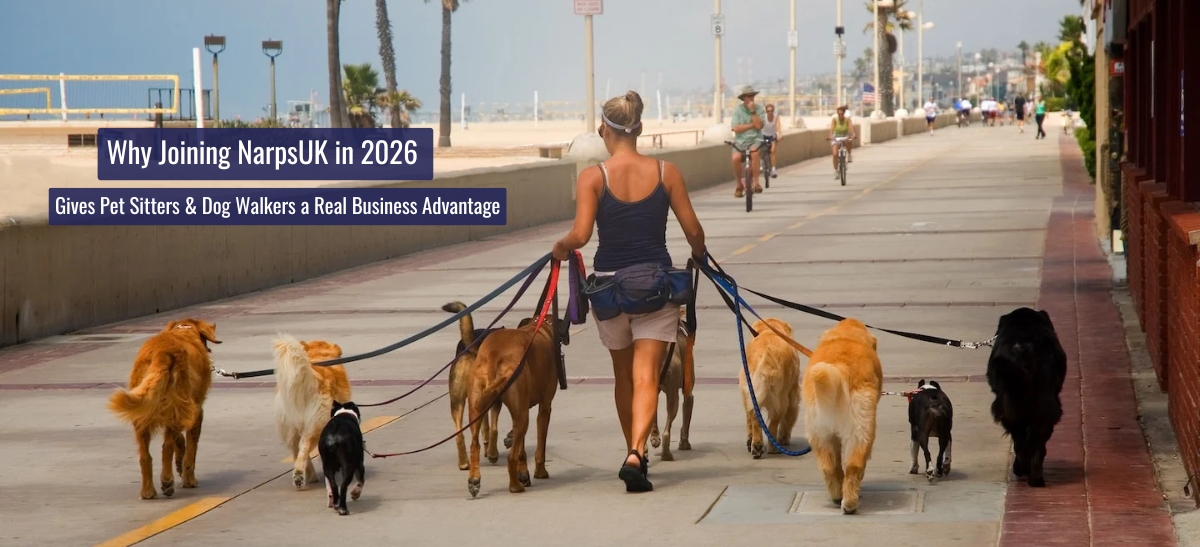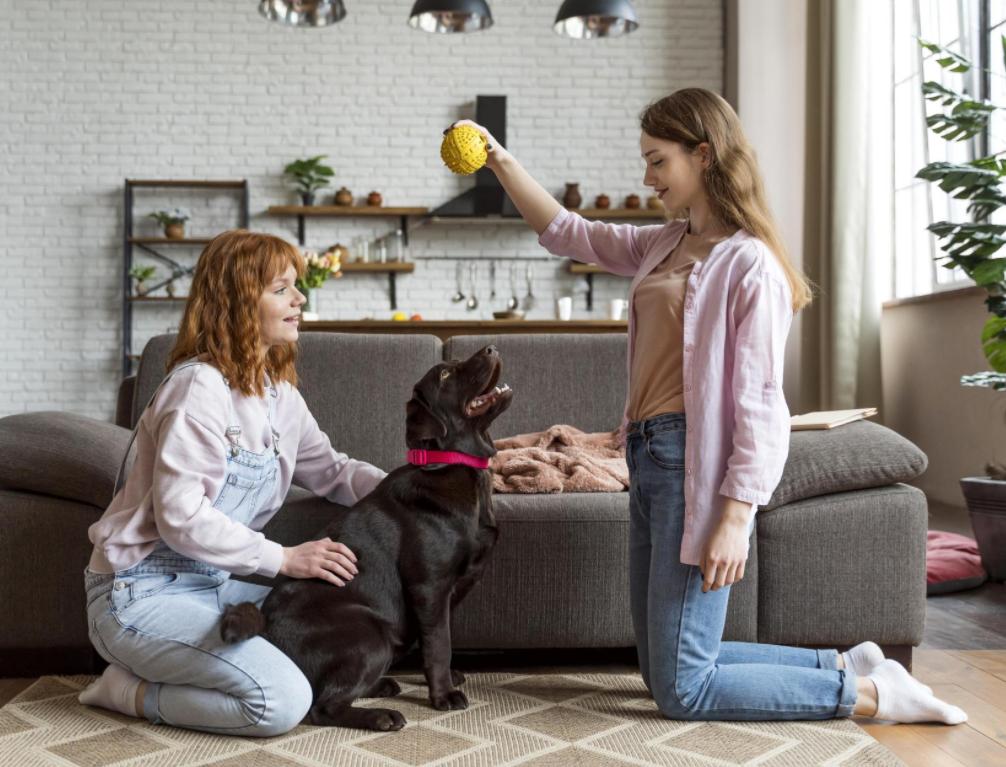5 Proven Marketing Strategies That Help Pet Sitters Get More Clients
Stop searching! This guide reveals 5 proven marketing strategies to get more pet sitting clients in the UK. Build trust, optimise locally, and grow your business professionally....
 (1).webp)
NarpsUK has today been provided with guidance from the Canine and Feline Sector Group which has been written with DEFRA, who have provided an updated document to assist animal businesses to operate in a safe manner to protect the health of their staff and clients. The relevant sections have been copied below, or you can view the full document on the CFSG website this is also where you can find the Handover Protocol.
COVID-19 – ADVICE FOR ANIMAL RELATED BUSINESSES AND LOCAL AUTHORITIES IN ENGLAND
11th May 2020 (This guidance is subject to change depending on Government advice)
Introduction
This guidance has been updated in the light of revised Government advice (11.5.20) on Coronavirus to balance public health protection requirements and the need for businesses to keep working. There remains no evidence that pets are implicated in the transmission of Coronavirus to people and infection of the pet is unlikely, but that there is some risk of virus being carried by pets and their belongings. However the risk of transmission between infected clients and business staff remains and the disease status of the client, if known, will assist in risk assessment.
The status of a household is an important element of risk assessment. Clearly contact with an infected or self-isolating household carries a higher risk than with any other. The risk to the household of shielding or vulnerable people is greater and therefore requires more precautions. Because there is some possibility of the pet carrying virus between households it is appropriate to evaluate the risk in each circumstance to minimise the public health consequences. It is inevitable that the status of a household can change from one group to another and that the precautions suitable for the pet will change at the same time.
The simple precaution of washing hands for twenty seconds as frequently as possible should now be intrinsic in every activity. In this advice document it is assumed that hand washing and social distancing are intrinsic in all activities.
CFSG has produced a handover protocol between people walking friends’ and neighbours’ dogs. The protocol should also be used when handing over dogs between a business and client.
Where it is recommended that a pet is wiped down the cloth used should be disposable and similar to the size and material of a J-cloth. It should be thoroughly wetted and squeezed first, used to wipe down the pet and should then disposed of directly into a waste bin. Do not re-use the cloth. You should not use any disinfectant.
Social distancing rules must be observed throughout every activity. This is a 2 metre distance between each individual. If at all possible, and if it is safe to do so, any handovers should be done outside. Risk assessments need to be undertaken to ensure the business is working in a safe way to protect members of staff and the public. The principles have been set out by government here.
Guidance on which journeys are appropriate is taken from UK Government Guidance on Social Distancing published 11.5.20.
In all circumstances where payment is included in a process the use of cash should be avoided. Where possible payment should be made using a credit or debit card or by electronic banking. You should check that your insurance company is prepared to cover you for any activity undertaken during this period.
BOARDING ESTABLISHMENTS
Most boarding establishments will have very low occupancy rates owing to cancelled holidays, however there is a significant requirement to care for the pets of people hospitalised from coronavirus and for key workers, shielded and vulnerable people who may not be able to care for their pets. Boarding establishments may make arrangements with shelters and rescues if needed. Pets should only be admitted or sent home by appointment to ensure you only have a single client on the premises at any one time. Animals being collected or taken by their owner to the boarding establishment may well be carrying the virus on their coat, or on belongings such as leads. The handover protocol set out by CFSG should be followed with the owner retaining all equipment such as leads. Any material such as collars, toys and food bowls arriving with an animal should be thoroughly washed with soap and water and left to dry in the open air. Handover should take place in a room or space large enough for the client and staff to maintain their social distance. Pets should be wiped down with a pet safe disposable damp cloth which should be disposed of properly afterwards before they are put into the collecting vehicle or admitted.
If an animal is taken from a Coronavirus infected household they should be held in the establishment’s isolation facility for three days to ensure no virus is retained on the pet. During that period those pets should be dealt with after all others on the premises.
Animal rescue and re-homing organisations may also be under pressure from animals being abandoned and particularly if they have a stray dog contract with the local authority. Boarding establishments may also wish to offer space to them.
Clearly a proportion of any of those animals may not have up to date vaccinations. Veterinary practices may be able to offer vaccination if a disease and public health assessment by the vet shows it to be appropriate and social distancing can be maintained. The boarding establishment’s veterinary practice should be contacted for advice regarding this. If, on assessment, the veterinary practice feels vaccination is appropriate, it may be that the risk of a visit by a vet and veterinary nurse is considered less of a public health risk than individual animals being taken to the owner’s practice. It is important to increase biosecurity within the boarding establishment to reduce the likelihood of disease. This may be achieved by increased use of disinfectant, personal hygiene by the use of hand gel or hand washing between animals and by better separation of animals. Establishments should be able to provide an enhanced SOP for use in current circumstances to satisfy their local licensing authority.
HOME BOARDING
Similar to boarding establishments it is likely that most will be little used. Priority should be given to board dogs from households of key workers, or shielded and vulnerable people. Dogs from infected or self-isolating households should not be mixed with others from non-infected households. The handover protocol set out by CFSG should be followed.
All admission and return of dogs should be by appointment only to ensure clients are able to maintain social distance. The home boarder may collect the dog or the client may drop off and collect the dog. You should only have one person dropping off or collecting their dog at a time. If the dog is collected they should be wiped down with a pet safe disposable damp cloth which should be disposed of properly afterwards before putting them in the vehicle and the owner retaining all equipment such as leads. When the dog is dropped off at their home it should be wiped down before entering the house. The home boarder must wash all equipment with soap and water once the dog/s have left. The owner’s lead should be retained by them. Dogs should be walked on a lead locally, maintaining social distance from other people and pets.
COMMERCIAL DOG DAY CARE
Commercial day care may continue to operate and priority should be given for key workers, and shielded and vulnerable people who are unable to make alternative safe arrangements for their dog. Dogs may be collected from their home or owners may drop off and collect their dogs by appointment only. This is to ensure clients are able to maintain their social distance from others by only having one client on the premises at a time. If dogs are brought to site owners should remain in their vehicles until staff are ready to accept their dog with a similar procedure on return.
Handover should take place in a room or space large enough for the client and staff to maintain their social distance. The handover protocol set out by CFSG should be followed with the operator wiping the dog down with a pet safe disposable damp cloth which should be disposed of properly afterwards before putting them in the vehicle and the owner retaining all equipment such as leads.
If dogs are collected, only those from households that are not infected or self-isolating should be collected on each trip. If establishments wish to accept dogs from infected or self-isolating households they must be collected and returned separately. Such dogs should not be mixed with those from ‘clear’ households but may be kept in a completely separate group. Each dog should be wiped down with a disposable pet safe cloth on arrival which should be disposed of properly afterwards. The vehicle must be disinfected between journey if transporting dogs from infected or self-isolating households.
The entire premises must be cleaned and disinfected at the close of each day.
HOME DOG DAY CARE
Home day care may continue to operate and priority should be given for key workers who are unable to make alternative safe arrangements for their dog. Dogs may be collected from their homes or owners may drop off and collect their dogs by appointment to ensure the maintenance of social distance between clients by only having one client on the premises at a time. The handover protocol set out by CFSG should be followed with the operator wiping the dog down with a pet safe disposable damp cloth which should be disposed of properly afterwards before putting them in the vehicle or taking the dog into the house. The owner should retain all equipment such as leads.
Dogs from households that are infected or self-isolating should not be mixed with others from non-infected households.
Handover should take place in a room or space large enough for the client and staff to maintain their social distance.
Dogs should be walked on a lead locally, maintaining social distance from other people and pets, and not transported in a vehicle to exercise unless absolutely necessary.
DOG WALKERS
Dog walkers can continue to operate and priority should be given to key workers, and shielded and vulnerable people who are unable to make alternative safe arrangements for their dog. Dogs from coronavirus infected or self-isolating households may be walked but if doing so they must be walked after dogs from all other households.
The handover protocol set out by CFSG should be followed with the owner retaining all equipment such as leads. Handover should take place in a room or space large enough for the client and staff to maintain their social distance. Dogs from different households may be walked together as long as dogs from infected or self-isolating households are not mixed with others from non-infected households. Social distancing should be maintained for both the walker and the dogs by keeping the dogs on a lead at all times. Any equipment, including the vehicle if used to transport the dog, must be cleaned and disinfected between dogs.
Stop searching! This guide reveals 5 proven marketing strategies to get more pet sitting clients in the UK. Build trust, optimise locally, and grow your business professionally....

Thinking about joining NarpsUK? Learn how membership helps UK pet sitters and dog walkers grow with insurance, training, software, and trusted business support in 2026....

As 2026 approaches, pet care in the UK is changing fast. From rising expectations around safety and professionalism to new services pet owners want, this guide explores the key trends shaping the futu...